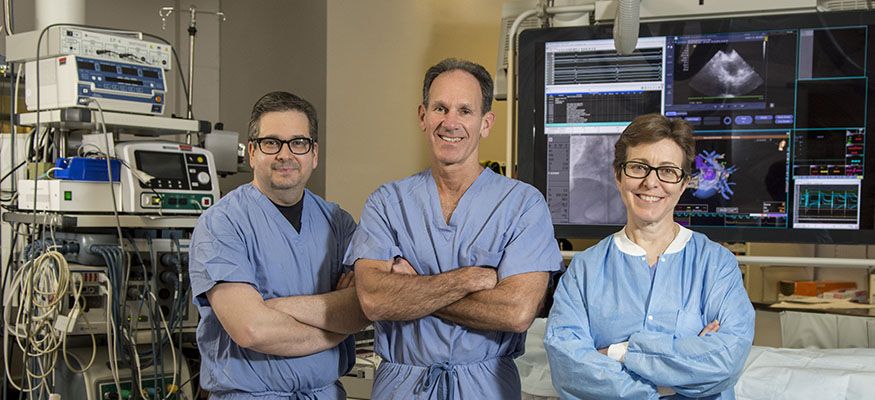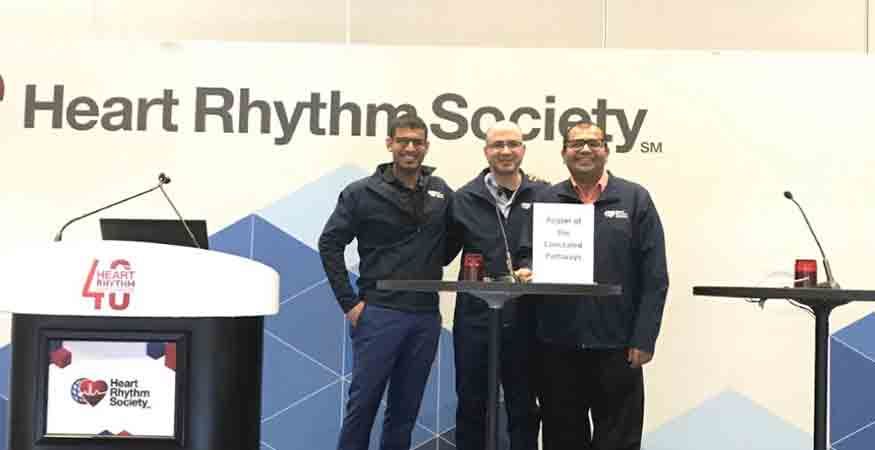
Overview
The Clinical Cardiac Electrophysiology Fellowship is an ACGME-accredited subspecialty fellowship program within the Division of Cardiology at the George Washington University School of Medicine and Health Sciences in Washington, D.C. We recruit one CCEP fellow for advanced training annually.
This two-year fellowship provides outstanding preparation in the study of clinical cardiac electrophysiology (EP). Fellows graduating from the GW EP program are well trained in all aspects of advanced arrhythmia therapies, including diagnostic EP testing, arrhythmia mapping, atrial and ventricular ablation, and cardiac electrical implantable device therapies. One of our guiding principles is that an electrophysiologist must have more than technical expertise. We emphasize the human aspects of what we do. Who is this patient? What are we planning to do and why are we treating them? And most importantly- is this in the best interest of the person?
Throughout the training, the fellow is given increasing responsibility in invasive procedures in the EP laboratory. Fellows work very closely with our faculty and receive feedback at every step along the way. We encourage fellows to take full advantage of local and national programs to supplement their learning. They are given an in service exam in the first and second year to ensure that they are getting all the information they need.
For questions, please contact the program coordinator:
Anissa Ashraf
E: anashraf [at] mfa [dot] gwu [dot] edu (anashraf[at]mfa[dot]gwu[dot]edu)
P: 202-741-2255 option 1
F: 202-741-2788
Structure
Sample Schedule
| Rotation | 1 July |
2 August |
3 September |
4 October |
5 November |
6 December |
|---|---|---|---|---|---|---|
| GW-CCEP | GW-CCEP | VA-CCEP | GW-CCEP | WAH-CCEP | GW-CCEP | |
| Rotation | 7 January |
8 February |
9 March |
10 April |
11 May |
12 June |
| VA-CCEP | GW-CCEP | WAH-CCEP | GW-CCEP | VA-CCEP | GW-CCEP |
Throughout the training, the fellow is given increasing level of responsibility in invasive procedures in the EP laboratory. Fellows work very closely with our faculty and receive feedback at every step along the way. We encourage fellows to take full advantage of local and national programs to supplement their learning. They are given an in service exam in the first and second year to ensure that they are getting all the information they need.>
Training Environment
The parent hospital is the George Washington University Hospital which is in the center of the George Washington University Campus. This vibrant and exciting area is in the heart of the nation’s capital. GW Hospital’s central location brings many advantages. GW is multidisciplinary, tertiary care hospital that serves a diverse group of patients, from area residents to visiting dignitaries and heads of state. The 371bed hospital was recognized by U.S. News & World Report has as a Best Hospital for 2019-2020, ranking it among the top 10 percent of hospitals in the Washington, D.C. metropolitan area. Dynamic trauma services, ICU services, heart failure program and CT surgery enhance the opportunities for the CCEP fellow.
Our partner hospital is the Washington VA Medical Center in Washington, D.C. The Washington DC VA Medical Center, is the only health care system that specifically provides care to Veterans. Offering tertiary care in a Complexity Level 1A hospital, and has 164 acute care beds and serves over 200000 Veterans who are enrolled for VA health care in the Washington, DC metropolitan area., The Washington VA is unique in VA Medical system and offers a comprehensive “Heart Center” that structural heart disease, advanced cardiac surgical therapy and advanced arrhythmia management. The VA Pacemaker Program is an outstanding, pioneering example of telemedicine and led the field for decades. Combined the Eastern Pacemaker Surveillance Center, located in Washington DC, and the Western Center in San Francisco follow 60000 patients.
Rotations
Fellows in CCEP rotate at the two hospitals and given the collaborative nature of the program, the fellow can exercise a good deal of flexibility to be sure that they are focusing on what interests them most. A typical rotation will be of one month duration. Here at GW, you will have the opportunity to work in our state of the art EP lab, fully equipped for 3D mapping, intracardiac echo, and offering a variety of ablation modalities. Our Hybrid lab is used for laser lead extraction. Device implants, including left atrial appendage occlusion is usually done here in the EP lab. If needed, we can use one of the other cardiac cath labs for procedures not requiring advanced mapping. The lab has outstanding technicians, nurses and midlevels who help facilitate our cases. Housed here within the cath and IR suite and steps away from the OR and the cardiac ICU is the ideal location for access to all the specialists, consultants and equipment that we might need.
Faculty
Core CCEP Faculty
| Marco Mercader, MD Director, Clinical Cardiac Electrophysiology Fellowship Program Associate Professor of Medicine George Washington University Hospital |
Cynthia Tracy, MD George Washington University Hospital |
| Allen Solomon, MD Cardiology Program Director George Washington University Hospital |
Hans Moore, MD Associate Director, VA National Cardiac Device Surveillance Veterans Affairs Medical Center |
| Pamela Karasik, MD Acting Chief, VA Cardiology Veterans Affairs Medical Center |
Research

We are active in Biomedical Research and work closely with the School of Engineering and Applied Sciences. Recent sample projects have included development of new technologies. Active projects include development of new optoelectric pacemakers and new defibrillation technology. We have completed a 10-year project developing an innovative catheter for monitoring ablation lesion formation using NADH fluorescence and fiber optics. Ongoing projects include new sensors and actuators to detect the ventricular tachycardia waveforms using memristor computing technology. Our goal is to have our residents, cardiology and EP fellows actively involved in cardiac arrhythmia research. Fellows can also be involved in a number of clinically based projects.
Service
A unique aspect of our program is the annual medical mission to Honduras. Every year we are joined by residents and fellows on this life changing experience to Honduras where not only do we care for the most needy population, but have made lifelong friends. Each year, the team has come back with special memories and have been had several presentations and publications based on our work there. We invite you to take a look at the video from our last mission.